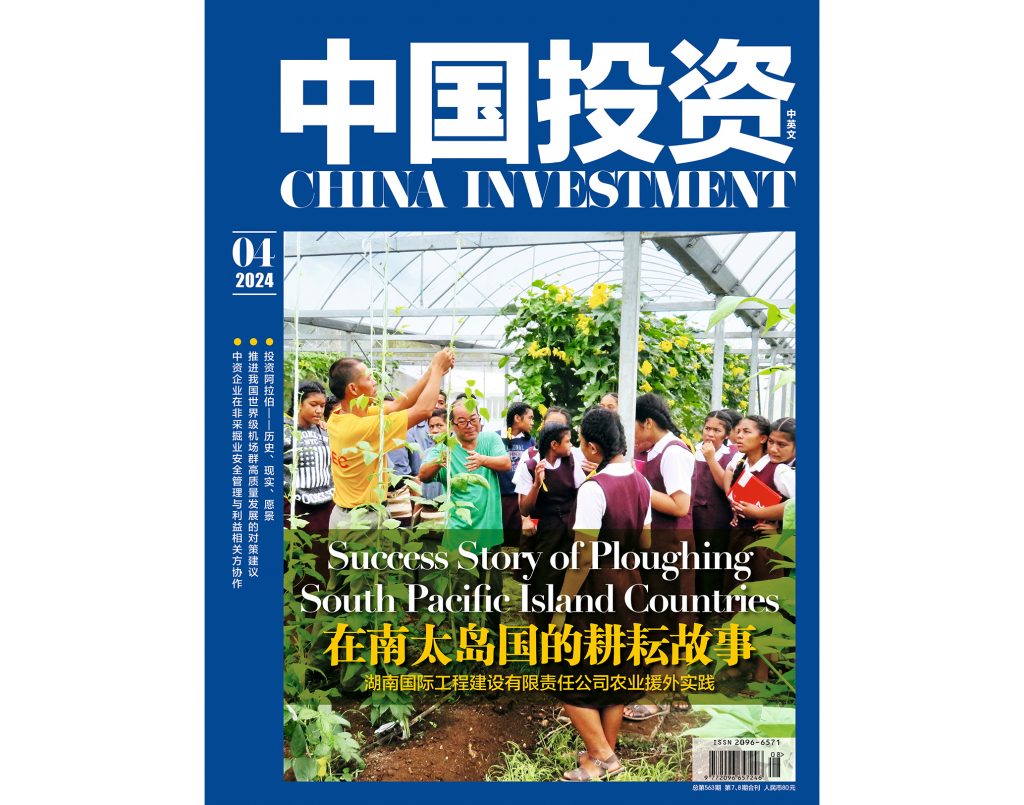
4月号封面文章
在南太岛国的耕耘故事
湖南国际工程建设有限责任公司农业援外实践
● 脚踏实地的中国援农特色——专访汤加王国官员Viliami T. Manu 和密克罗尼西亚联邦官员Semes Silbanus、Eugene Joseph / 蔡雨恬 黄凯伦 唐溪源
● “提高了本地居民收入,改善了生活水平”——专访援密克罗尼西亚联邦农业技术项目专家代表 / 黄凯伦 宋睿 唐溪源
● 援助与教学共进,助力南太改善民生——专访汤加王国和密克罗尼西亚联邦农户和学生代表 / 宋睿 唐溪源
● 小生态有大效用——“猪- 沼- 菜”生态循环清洁农业模式在南太地区的应用与推广 /蔡雨恬 唐溪源
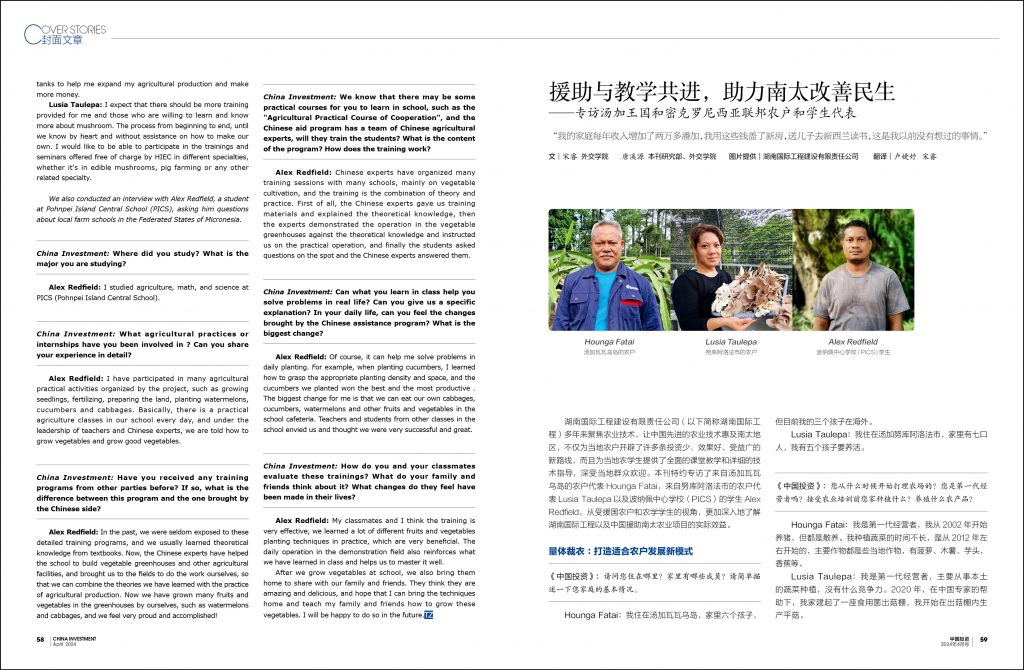
文|宋睿 外交学院 唐溪源 本刊研究部、外交学院 图片提供|湖南国际工程建设有限责任公司 翻译|卢婕妤 宋睿
导读
●量体裁衣:打造适合农户发展新模式
●对症下药:引入农业新技术
●今非昔比:极大改善农户生活条件
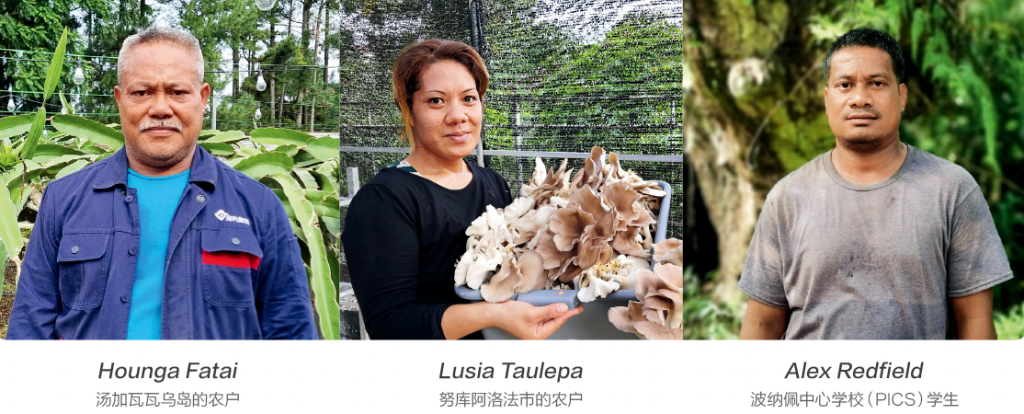
湖南国际工程建设有限责任公司(以下简称湖南国际工程)多年来聚焦农业技术,让中国先进的农业技术惠及南太地区,不仅为当地农户开辟了许多条投资少、效果好、受益广的新路线,而且为当地农学生提供了全面的课堂教学和详细的技术指导,深受当地群众欢迎。本刊特约专访了来自汤加瓦瓦乌岛的农户代表Hounga Fatai,来自努库阿洛法市的农户代表Lusia Taulepa以及波纳佩中心学校(PICS)的学生Alex Redfield,从受援国农户和农学学生的视角,更加深入地了解湖南国际工程以及中国援助南太农业项目的实际效益。
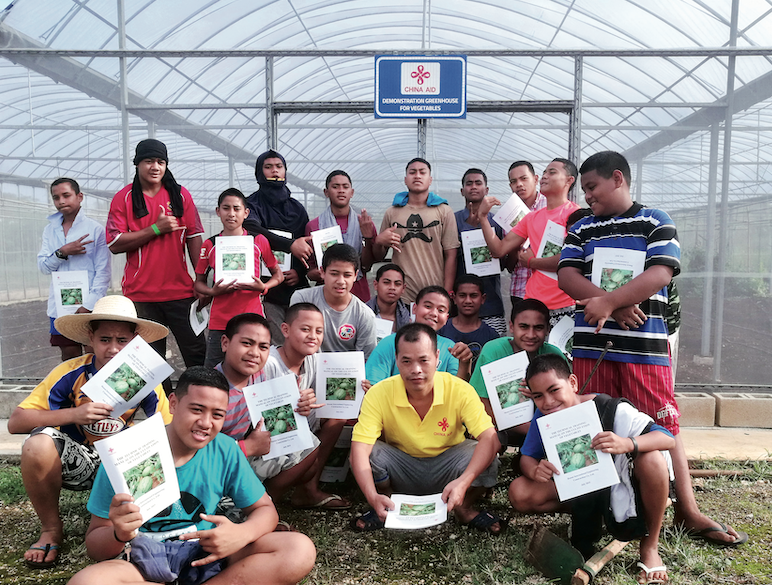
⬆ 专家组与参加农学实践课的图普学院学生合影
量体裁衣:打造适合农户发展新模式
《中国投资》:请问您住在哪里?家里有哪些成员?请简单描述一下您家庭的基本情况。
Hounga Fatai:我住在汤加瓦瓦乌岛,家里六个孩子,但目前我的三个孩子在海外。
Lusia Taulepa:我住在汤加努库阿洛法市,家里有七口人,我有五个孩子要养活。
《中国投资》:您从什么时候开始打理农场的?您是第一代经营者吗?接受农业培训前您家种植什么?养殖什么农产品?
Hounga Fatai:我是第一代经营者,我从2002年开始养猪,但都是散养。我种植蔬菜的时间不长,是从2012年左右开始的,主要作物都是些当地作物,有菠萝、木薯、芋头,香蕉等。
Lusia Taulepa:我是第一代经营者,主要从事本土的蔬菜种植,没有什么竞争力。2020年,在中国专家的帮助下,我家建起了一座食用菌出菇棚,我开始在出菇棚内生产平菇。
《中国投资》:您一开始是从哪里了解到湖南国际工程(HIEC)援助项目的?又是如何参与进来的呢?
Hounga Fatai:在中国援汤加瓦瓦乌岛项目开始实施后,中方专家种出多种多样的果蔬产品,由于我是瓦瓦乌农业局的职员,多次接触后我便产生了极大的兴趣,申请成为了项目的跟班学员,跟着中方专家组学习农业生产技术。在退休后,我也应聘成为了项目示范区果蔬种植专业的当地长期雇工。
Lusia Taulepa:我是在农学院了解到了湖南国际工程的援助项目。在那里,我认识了当时的肖组长,对这个援助项目也有了更多的了解。后来我一直跟着食用菌专家学习食用菌栽培技术,也在湖南国际工程的帮助下,建起了属于自己的出菇棚,开始种植食用菌。
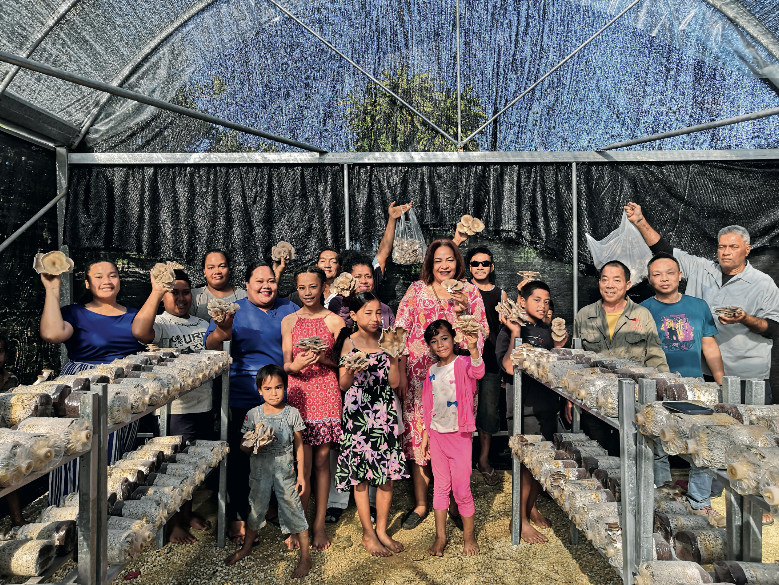
⬆ 示范农户展示在中国专家指导下丰收的食用菌
对症下药:引入农业新技术
《中国投资》:您家是否建设了沼气池? 您之前了解过沼气池吗?
Hounga Fatai:我家是建了沼气池的。之前我完全不了解沼气,看到项目示范区里新建的沼气系统后我才明白沼气是什么。后来,我跟着湖南国际工程的专家学习,慢慢才了解到沼气的用处。2021年,中国援汤项目为我的家庭建立了“猪-沼-菜”生态循环清洁农业模式,从各个方面改变了我的生活。
《中国投资》:中国专家带来的这些技术对您来说有哪些新奇之处?
Hounga Fatai:中方专家带来的新技术和新品种太多了。他们为我们建了猪舍、沼气池、雨水收集系统,还帮助我新建了火龙果种植地,让我成为了汤加第一批火龙果种植示范户。大棚、圈养生猪和沼气这些技术都是我们没见过的,沼气不仅可以解决生猪的粪便,还可以产生燃气和肥料,我感觉十分神奇。除此之外,火龙果对我来说是很新奇的品种,我家人很喜欢。
《中国投资》:您觉得用这种方式养出来的猪比以前健壮吗?猪长得有没有比以前快?会不会比以前的猪更少生病?卖猪带来的经济收入有没有提高?
Hounga Fatai:以前我们的生猪都是散养,把院子弄得又脏又乱,而且经常有丢猪和死猪的现象,产仔率也低,产出的生猪仅够家庭食用,不够补贴家用。现在湖南国际工程的项目帮我建了猪舍,开始圈养之后,农场周边的卫生环境得到很大的改善,不仅丢失、死亡的生猪数量大大减少,生猪产仔的数量增多,还有多余的小猪可供销售,为我们提供了额外的收入。
《中国投资》:您怎么看中国专家带来的培育食用菌的技术?这种方式养出来食用菌品质如何?在当地受欢迎吗?
Lusia Taulepa:目前我所学到的技术是关于生产和管理食用菌的技术,都是从郑专家那里学得的,对我来说是全新的知识和技术。一开始我觉得非常神奇,通过木屑、椰子壳这些平日可见的原料就能生产出非常鲜美的食用菌,实在是非常了不起。郑专家培育出了很多食用菌新品种,我们都非常喜欢。食用菌的一个好处是,一旦烹饪得当,就不需要加入任何肉类,因为它本身就很美味。它含有大量维生素,有助于我们摄入更健康的食物。就我所知,由湖南国际工程栽培的榆黄蘑在我们本地的市场上很畅销,非常受当地人的喜爱。
《中国投资》:和您对接的中方专家是哪位?可以给我们简单描述一下中方专家的示范过程吗?如果遇到困难或有不理解的地方,专家是如何解决的?或许您有具体的例子吗?
Hounga Fatai:我家示范农田有很多,整个专家组都来我家提供过技术服务,也经常向我赠送赠送肥料、饲料等农资,我自己跟班学习期间也学到了很多,基本技术都掌握了。我印象最深的是在2020年1月,飓风Tino袭击吹坏了我家的屋顶,当时慌乱之下我向项目中方专家组求助。中方专家非常热心,紧急将我全家安置在示范区办公室居住,免费给我们提供饮水、食物及其他生活物资,飓风过境后还协助我重建家园,让我们非常感动。
Lusia Taulepa:在针对食用菌的培训中,中方专家都非常仔细。郑专家最先帮助我,他向我详细解说了食用菌生产需要的原料,方法及工艺。在卢翻译的协助下,郑专家向我现场展示食用菌栽培和种植。我跟着郑专家学习了食用菌生产的整个流程,遇到不理解的地方,郑专家会多次的示范、仔细讲解,直到我弄懂为止。食用菌的接种容易产生杂菌,郑专家示范后会让我自己尝试,他在一旁观察我的操作手法,并指出我的错误。
今非昔比:极大改善农户生活条件
《中国投资》:接受HIEC援助后,农场里要做的农活和之前比有什么改变?对您来说轻松吗?
Hounga Fatai:有很多变化。有了蔬菜大棚后,害虫变少了;配套的雨水收集罐、安装的滴灌、生猪饮水系统也解决了用水问题;有了猪舍之后,猪仔也不会丢失了。我要做的农活简单了不少。
Lusia Taulepa:食用菌的管理比较容易,对场地的要求也比较低,我每天只要在家里的出菇棚给菌包浇水就可以了,非常轻松。
《中国投资》:中方的援助项目给您的生活带来了什么改变?收入有增多吗?
Hounga Fatai:我们生活发生了巨大的改变。我现在进行蔬菜种植、火龙果种植并在火龙果种植地套种蔬菜。用“猪-沼-菜”生态循环清洁农业模式饲养生猪,将饲养生猪的废弃物通过沼气池发酵,其产生的沼液沼渣作为肥料,使用沼气做饭,这既为我们提供了很多收益,又为我们节省了不少开支。我主要负责种植、养殖,妻子带着家里产出的生猪、蔬菜和火龙果在市场上销售,我的家庭每年收入增加了两万多潘加,我用这些钱盖了新房,送儿子去新西兰读书,这是我以前没有想过的事情。
Lusia Taulepa:我的家庭条件改善了很多。我是一个全职妈妈,有五个孩子,老公腿脚不方便,平时靠帮人修理一些电器赚钱。在湖南国际工程项目的指导和帮助下,我每年能获得一万汤币的收益,同时能够照顾家里的孩子。而我做这些生意没有任何损失,也几乎没有任何成本,所有的工作都是由湖南国际工程完成的,我所要做的就是照看食用菌,收获,然后出售。我非常感谢湖南国际工程给我提供的帮助。
《中国投资》:听说中方培育出了当地没有的新作物,新农产品的产量如何?是否受当地人欢迎?销量如何?
Hounga Fatai:中方培育的甜瓜、茄子、萝卜、中式黄瓜、豆角、小葱,火龙果都是新的品种,我的家人朋友非常喜欢吃。但是也有部分中方培育的品种我吃不习惯,比方说苦瓜,虽然我知道它很健康,但我还是不大能接受。但是,中方培育出的火龙果非常受欢迎,在市场上可以卖到2~3潘加一枚,每次都供不应求。
《中国投资》:《中国投资》:在未来的合作中,您有什么建议或期望呢?
Hounga Fatai:我希望项目能够扩大大棚面积、猪舍面积和雨水收集水罐的数量,帮助我扩大农业生产规模,创造更多的收入。
Lusia Taulepa:我希望对于我和其他想要学习食用菌栽培技术的学员,湖南国际工程能够提供全面细致的培训,让我们在没有专家帮助的情况下能完全熟练地掌握食用菌栽培技术。对我而言,我希望能够参加湖南国际工程免费提供的不同专业的培训和研讨会,无论是食用菌专业、养猪专业或其他相关的专业。
我们还对波纳佩中心学校(PICS)的学生Alex Redfield进行了一次专访,询问他关于密克罗尼西亚联邦当地农学校的问题。
《中国投资》:您在哪里学习?学什么专业呢?
Alex Redfield:我在PICS(波纳佩中心学校)学习农业、数学、科学专业。
《中国投资》:您参与过哪些中密合作的农业实践或实习项目?可以详细分享一下您的经历吗?
Alex Redfield:我参加了很多次中国援密农业项目组织的农业实践活动,比如蔬菜的育苗、施肥、整地,还针对性学习了西瓜、黄瓜、包菜、白菜等蔬果的种植培管技术。我们学校基本上每天都有农业实践课,我和同学们在老师和中方专家的带领下,学习怎样种菜、种好菜。
《中国投资》:您以前是否接受过其他方面给予的培训项目?如果有的话,和中方带来的有什么区别?侧重点有什么不一样?
Alex Redfield:我们以前很少接触这些细致的培训项目,平时都是在课本上学习理论知识。现在,中方专家帮助学校修建了蔬菜大棚等农业附属设施,把我们带到田地亲自操作,把我们学到的理论与农业生产实践相结合。现在我们自已在大棚内种出了很多果蔬,像西瓜、白菜等,我们感觉很自豪、很有成就感!
《中国投资》:我们了解到在学校可能会设置一些实践课程供大家学习,比如“中密合作的农学实践课”,中方的援助项目设有中国农业专家组,他们是否会对学生展开培训?都是关于什么内容呢?对学生的培训是怎么开展的呢?
Alex Redfield:中方专家与PICS学校一起举办了很多期培训,主要是关于蔬菜种植方面的,培训形式是采取理论与实践相接合的方式。首先由中方专家给我们发放培训资料,进行理论知识讲解,然后对照理论知识,专家们在蔬菜大棚进行操作演示,并手把手指导我们实践操作,最后由学生现场提问,中方专家进行解答。
《中国投资》:在课堂上学习到的内容,在现实生活中可以帮你解决问题吗?可以给我们具体说明一下吗?在您日常生活中,可以感受到中方的援助项目带来的变化吗?最大的变化是什么?
Alex Redfield:当然可以帮我解决日常种植时产生的问题,比如在种黄瓜时,我学到如何掌握合适的种植密度、间距与株距,我们在示范地种植的黄瓜是长势最好且产量最大的。对我而言,最大的变化就是在学校食堂吃上了我们自己种的白菜、黄瓜、西瓜等果蔬,学校其他班级的师生很羡慕我们,认为我们很有成绩,了不起。
《中国投资》:您和您的同学都是如何评价这些培训的?您的家人和朋友对此怎么看呢?他们觉得自己的生活产生了哪些变化?
Alex Redfield:我和同学都认为这些培训很有效果,我们在实践中学到了很多不同瓜果蔬菜的种植技术,受益很大。而日常在示范田里的操作也可以巩固我们课堂上学到的东西,更能帮助我们很好地掌握。
我们在学校种出蔬菜后,也会带回家给家人及朋友分享,他们认为很神奇、很好吃,希望我把技术带回家,教会家人及朋友怎样种植蔬菜。在未来我将会很乐意这样做。
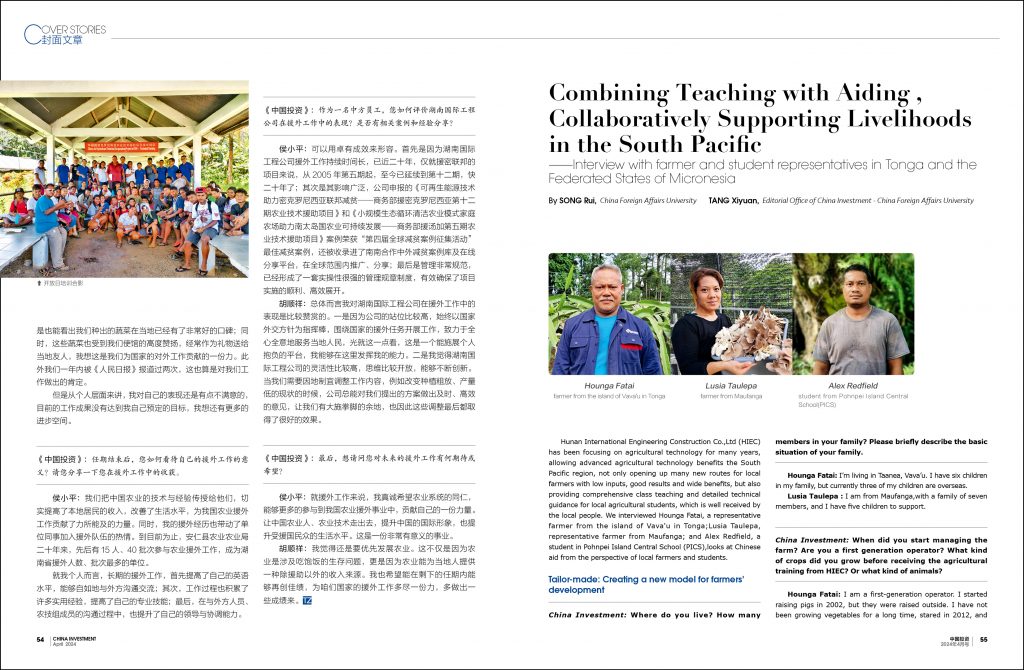
Combining Teaching with Aiding , Collaboratively Supporting Livelihoods in the South Pacific
——Interview with farmer and student representatives in Tonga and the Federated States of Micronesia
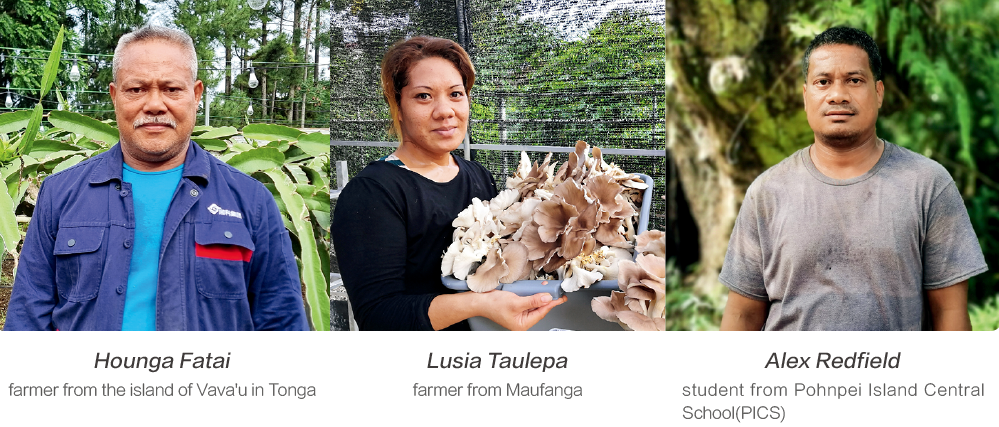
Hunan International Engineering Construction Co.,Ltd (HIEC) has been focusing on agricultural technology for many years, allowing advanced agricultural technology benefits the South Pacific region, not only opening up many new routes for local farmers with low inputs, good results and wide benefits, but also providing comprehensive class teaching and detailed technical guidance for local agricultural students, which is well received by the local people. We interviewed Hounga Fatai, a representative farmer from the island of Vava’u in Tonga;Lusia Taulepa, representative farmer from Maufanga; and Alex Redfield, a student in Pohnpei Island Central School (PICS),looks at Chinese aid from the perspective of local farmers and students.
Tailor-made: Creating a new model for farmers’ development
China Investment: Where do you live? How many members in your family? Please briefly describe the basic situation of your family.
Hounga Fatai: I’m living in Taanea, Vava’u. I have six children in my family, but currently three of my children are overseas.
Lusia Taulepa : I am from Maufanga,with a family of seven members, and I have five children to support.
China Investment: When did you start managing the farm? Are you a first generation operator? What kind of crops did you grow before receiving the agricultural training from HIEC? Or what kind of animals?
Hounga Fatai: I am a first-generation operator. I started raising pigs in 2002, but they were raised outside. I have not been growing vegetables for a long time, stared in 2012, and my main crops are local crops, such as pineapple, cassava, taro, bananas, etc.
Lusia Taulepa: I am a first-generation operator, mainly engaged in local vegetable cultivation, which was not competitive. In 2020, with the help of Chinese experts, my family built a mushroom shed and I started to produce oyster mushroom in the mushroom shed.
China Investment: Where did you first learn about the Hunan International Engineering Construction Company (HIEC) assistance program? How did you get involved?
Hounga Fatai: After the implementation of the Chinese-aided project on the island of Vava’u in Tonga, the Chinese experts grew a wide variety of fruits and vegetables. Since I was the staff of the MAFF, Vava’u , I became very interested in the project , so I applied to become a trainee of the project to learn the agricultural production techniques from the Chinese experts. After I retired, I also applied to become a local employee in fruit and vegetable cultivation in the demonstration area of the project.
Lusia Taulepa: I first heard from a farming college about HIEC, there I met Mr. Xiao , and learned more about the China aid project. Then I followed the mushroom expert to learn mushroom planting and had my own mushroom shed built by HIEC, finally I started plant mushroom.
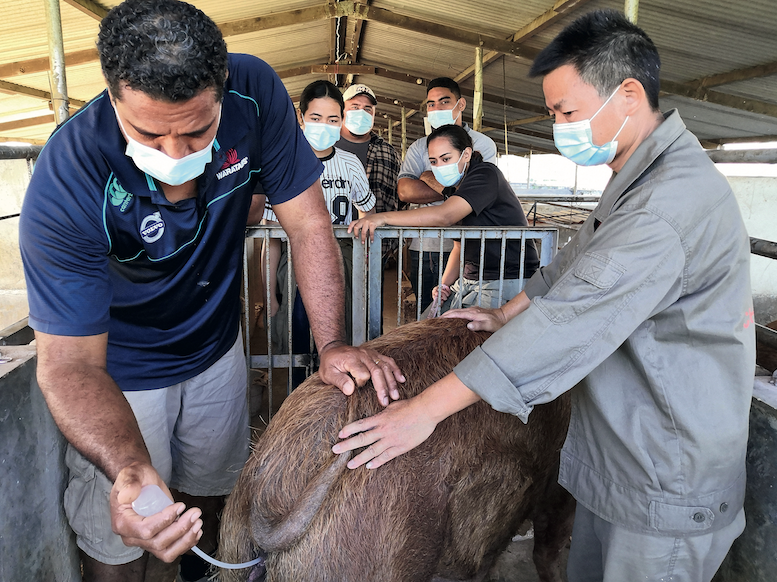
⬆ The expert group guides local pig farmers to artificially inseminate pigs
Suit the remedy to the case: Introducing new agricultural technologies
China Investment: Do you have a biogas digester? Have you known about biogas digester before?
Hounga Fatai: My family has built a biogas digester.I didn’t know about biogas before the project started, until I saw the biogas built by the project in the demonstration area. After I started work with the Chinese experts after the project implemented , I realized the usefulness of biogas and later in 2021, the China Aid project set up a “pig-biogas-vegetable” ecological recycling and clean agriculture system for my family, which has completely changed my life.
China Investment: What is new to you about the technologies brought by Chinese experts?
Hounga Fatai: Chinese experts have brought so many new technologies and varieties. They built greenhouse, pigsty, biogas and rainwater collection systems for us, they are something we have never seen before. And they also helped me build a new dragon fruit plantation, making me one of the first dragon fruit plantation demonstration households in Tonga. These amazing techniques not only solve the problems of the pigs, but also produce gas and fertilizer. By the way, dragon fruit is new to me, and my family likes it very much.
China Investment: Do you think the pigs farmed in this way are stronger than before? Do they grow faster than before? Are they getting sick less than before? Has the economic income from selling pigs increased?
Hounga Fatai: In the past, they were raised free-range, which made our yard dirty and messy, and they often lost or died, and a low farrowing rate, which was not enough to subsidize the family’s income. Now the project has helped me build a piggery and start raising pigs in captivity, the environment around the piggery has been greatly improved, the number of lost or dead pigs has been greatly reduced. We have more piglets produced and can sell the extra ones.
China Investment: How do you think of cultivating edible mushrooms brought by Chinese experts? What is the quality of edible fungus raised in this way? Is it popular in the region?
Lusia Taulepa: Everything that I have learned so far from Mr. Zheng about the production and management of mushroom is brand new technology for me. Produce delicious mushroom through waste materials like wood chips and coconut shells, these are usually seen and it was really amazing. Mr. Zheng has bred many new varieties of edible mushrooms, which we all enjoyed. One benefit of mushrooms is once they are cooked,they don’t need any meat cause they are already delicious. They have a lot of vitamins and they can help people consume the products which are good for their health. As far as i know,the Elm mushroom cultivated by HIEC which seemed to be the best seller in our local market and were very popular among our people.
China Investment: Who is the Chinese expert you are working with? Can you give us a brief description of the demonstration process of the Chinese expert? If you encountered difficulties or did not understand something, how did the expert solve it? Perhaps you have a specific example?
Hounga Fatai: My family has a lot of model farmland,the whole expert group had come to my house to provide technical services and often give me fertilizers, feed and other agricultural materials. I learned a lot during my training period, and I have mastered all the basic techniques.
My deepest impression was that in January 2020, the roof of my house was damaged by Hurricane Tino, I was so panicked and I asked the Chinese expert team for help. The Chinese experts were very warm-hearted, they urgently accommodated my family in their office, provided free water, food and other living materials for us. They even assisted me in rebuilding my house after the hurricane had passed, which impressed me a lot.
Lusia Taulepa: The Chinese experts were very careful during the training on edible mushrooms. Mr. Zheng helped me first, explaining in detail the raw materials, methods and processes needed. With the help of Lu’s interpreter, Mr. Zheng showed me on-site cultivation and planting of edible mushrooms. I learned the whole process with Mr. Zheng, and when I encountered something I didn’t understand, Mr. Zheng would demonstrate and explain it carefully for many times until I understood it. The inoculation of edible fungus is easy to produce stray bacteria, Zheng expert will let me try it by myself after the demonstration, and he will observe my maneuvers and point out my mistakes.
Changes: Significant differences of farming families
China Investment: After receiving HIEC’s assistance, how has the work to be done on the farm changed compared to before?Have these gotten any easier?
Hounga Fatai: There are many changes. With the vegetable greenhouses, there are fewer pests; the rainwater collection tanks, drip irrigation and pig watering system have solved the water problem; and with the pigsties, the piglets will not be lost. My farm work became much easier.
Lusia Taulepa: The management of edible mushrooms is relatively easy and requires less space. I just need to water the mushroom packs in the mushroom shed at home every day, which is quite easy.
China Investment: How has the Chinese aid program changed your life? Has your income increased?
Hounga Fatai: Our life has changed completely. I plant vegetable and dragon fruit, also plant vegetables in the dragon fruit plantation, raise pigs and use the biogas residue produced by fermentation of the pig waste in the digester as fertilizer. I use biogas for cooking, which provides us with a lot of revenue and saves us a lot of money. I am mainly responsible for planting and farming, and my wife takes the pigs, vegetables and dragon fruits produced by the family and sells them in the market. Our income has increased by more than 20,000 Pa’anga per year. I used the money to build a new house and send my son to New Zealand to study, which was something I hadn’t previously considered.
Lusia Taulepa: My family’s situation has improved a lot. I am a full-time mother with five children and my husband has difficulty with his legs, so we usually earn money by helping people to do some electrical repairing jobs. And now I can get ten thousand Pa’anga a year at home under the help of HIEC and at the same time I am able to take care of my children at home. And I have almost no cost to do this business, all the work is done by HIEC and all I have to do is to take care of the mushrooms, pick them and sell them. I am very grateful.
China Investment: I heard that the Chinese side has cultivated new crops that are not locally available, how are the yields of the new agricultural products? Are they popular with the locals? How is the sales volume?
Hounga Fatai: The Chinese experts cultivated melon, eggplant, radish, Chinese cucumber, long bean, spring onion and dragon fruit are all new varieties, and my family and friends both like them. There are also some Chinese varieties like bitter gourd, which is not quite acceptable although I know it is healthy. However, the dragon fruits developed by the Chinese experts are so popular. They can be sold in the market for 2-3 pa’anga each, and there is always be a shortage.
China Investment: What are your suggestions or expectations for future cooperation?
Hounga Fatai: I hope the project will expand the size of the greenhouse, piggery and the number of rainwater collection tanks to help me expand my agricultural production and make more money.
Lusia Taulepa: I expect that there should be more training provided for me and those who are willing to learn and know more about mushroom. The process from beginning to end, until we know by heart and without assistance on how to make our own. I would like to be able to participate in the trainings and seminars offered free of charge by HIEC in different specialties, whether it’s in edible mushrooms, pig farming or any other related specialty.
We also conducted an interview with Alex Redfield, a student at Pohnpei Island Central School (PICS), asking him questions about local farm schools in the Federated States of Micronesia.
China Investment: Where did you study? What is the major you are studying?
Alex Redfield: I studied agriculture, math, and science at PICS (Pohnpei Island Central School).
China Investment: What agricultural practices or internships have you been involved in ? Can you share your experience in detail?
Alex Redfield: I have participated in many agricultural practical activities organized by the project, such as growing seedlings, fertilizing, preparing the land, planting watermelons, cucumbers and cabbages. Basically, there is a practical agriculture classes in our school every day, and under the leadership of teachers and Chinese experts, we are told how to grow vegetables and grow good vegetables.
China Investment: Have you received any training programs from other parties before? If so, what is the difference between this program and the one brought by the Chinese side?
Alex Redfield: In the past, we were seldom exposed to these detailed training programs, and we usually learned theoretical knowledge from textbooks. Now, the Chinese experts have helped the school to build vegetable greenhouses and other agricultural facilities, and brought us to the fields to do the work ourselves, so that we can combine the theories we have learned with the practice of agricultural production. Now we have grown many fruits and vegetables in the greenhouses by ourselves, such as watermelons and cabbages, and we feel very proud and accomplished!
China Investment: We know that there may be some practical courses for you to learn in school, such as the “Agricultural Practical Course of Cooperation”, and the Chinese aid program has a team of Chinese agricultural experts, will they train the students? What is the content of the program? How does the training work?
Alex Redfield: Chinese experts have organized many training sessions with many schools, mainly on vegetable cultivation, and the training is the combination of theory and practice. First of all, the Chinese experts gave us training materials and explained the theoretical knowledge, then the experts demonstrated the operation in the vegetable greenhouses against the theoretical knowledge and instructed us on the practical operation, and finally the students asked questions on the spot and the Chinese experts answered them.
China Investment: Can what you learn in class help you solve problems in real life? Can you give us a specific explanation? In your daily life, can you feel the changes brought by the Chinese assistance program? What is the biggest change?
Alex Redfield: Of course, it can help me solve problems in daily planting. For example, when planting cucumbers, I learned how to grasp the appropriate planting density and space, and the cucumbers we planted won the best and the most productive . The biggest change for me is that we can eat our own cabbages, cucumbers, watermelons and other fruits and vegetables in the school cafeteria. Teachers and students from other classes in the school envied us and thought we were very successful and great.
China Investment: How do you and your classmates evaluate these trainings? What do your family and friends think about it? What changes do they feel have been made in their lives?
Alex Redfield: My classmates and I think the training is very effective, we learned a lot of different fruits and vegetables planting techniques in practice, which are very beneficial. The daily operation in the demonstration field also reinforces what we have learned in class and helps us to master it well.
After we grow vegetables at school, we also bring them home to share with our family and friends. They think they are amazing and delicious, and hope that I can bring the techniques home and teach my family and friends how to grow these vegetables. I will be happy to do so in the future.

